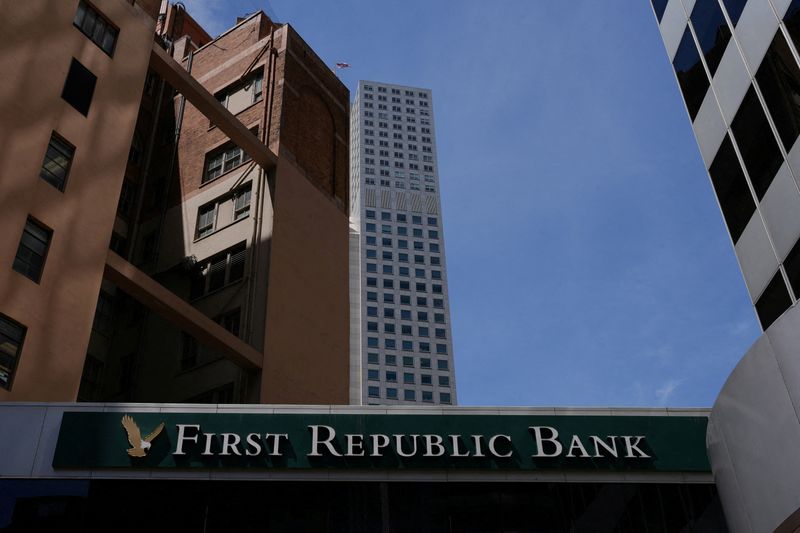By Saeed Azhar, David French and Tatiana Bautzer
NEW YORK (Reuters) -The government-brokered purchases of First Republic, Signature and Silicon Valley banks have created a vicious cycle in which troubled lenders need to fail -- and get government assistance -- before buyers will step up, industry sources say.
The latest case in point: The Federal Deposit Insurance Corp (FDIC) chose JPMorgan Chase & Co (NYSE:JPM) as the winning bidder in an auction to buy collapsed lender First Republic Bank (OTC:FRCB) on Monday.
After First Republic struggled to find a private-sector buyer for weeks, the FDIC seized it and struck a deal with JPMorgan to take control of most of its assets. JPMorgan said it would pay $10.6 billion to the FDIC, while locking in a loss-sharing agreement with the government on residential mortgages and commercial loans. The FDIC would also provide JPMorgan $50 billion of financing for five years at an undisclosed fixed rate as part of the deal.
"After what happened with First Republic, banks don't want to buy any other bank before the FDIC takes over," said Mayra Rodríguez Valladares, a financial risk consultant at MRV Associates who trains bankers and regulators.
"It's cheaper, the stock price goes down and you don't have the natural problems in M&A (mergers and acquisitions) negotiations that may not end in a deal."
The phenomenon is stoking fears the current turmoil will accelerate the concentration of the banking sector in the United States around a handful of institutions, reducing competition for consumers and deepening the risk if a giant bank fails.
Silicon Valley Bank, which imploded in March and sparked the ongoing turmoil in regional banks, was also purchased by First Citizens BancShares with FDIC help. The purchase drained about $20 billion from an insurance fund that is financed by banks and run by the government.
The acquisition of the collapsed Signature Bank (OTC:SBNY) by New York Community Bancorp (NYSE:NYCB) also involved a buyer cherry-picking parts it wanted to take and leaving unwanted assets, such as Signature's crypto portfolio. The deal cost the fund $2.5 billion.
After these transactions, publicly-traded buyers are now motivated to wait for ailing lenders to collapse so they can get better terms from the FDIC, analysts said.
"For potential acquirers, there is a motivation to wait for a receivership and FDIC assistance," Christopher Wolfe, head of North American banks at Fitch Ratings.
FDIC officials, however, say would-be buyers risk losing out if they allow the value of an acquisition target to deteriorate over time while waiting for an FDIC receivership.
They also deny mega-banks received special advantages in the recent failures - major banks could bid for SVB, Signature and First Republic, and only the last in that line was acquired by a bank considered a Global Systemically Important Bank, or G-SIB.
When accepting a winning bid in a receivership process, the FDIC must follow the "least-cost" test, which ensures the regulator accepts the offer that creates the lowest drag on the Deposit Insurance Fund.
JPMorgan and First Citizens declined to comment. New York Community Bancorp (NASDAQ:CTBI) did not respond to a request for comment.
SWEETENERS
U.S. bank mergers were already sluggish as interest rates rose and recession loomed, analysts at Raymond James wrote in an Apr. 3 note. The first quarter was the quietest opening to a year for bank deals in a generation, they said.
Volatility in regional bank stocks makes it even more difficult to strike deals. Take Los Angeles-based PacWest Bancorp - its shares jumped 82% Friday after sinking more than 40% on Thursday over news the company was exploring options to bolster its finances.
Market volatility stops bank buyers from pulling together enough money to cover writedowns on struggling assets, which would be triggered by a traditional acquisition, said David Sandler, co-head of financial services investment banking at Piper Sandler Companies.
While U.S. authorities were able to offset these requirements in the three receivership processes, they have also set an expectation that they will continue to extend sweeteners to buyers to offset potential losses on undesirable parts of shuttered banks' portfolios.
And in allowing JPMorgan, the largest U.S. bank, to purchase a collapsed lender, officials have upended a long-held view that the government would block banking giants from getting bigger, analysts and bankers said.
Concerns over whether bank rescues are unintentionally favoring bigger banks come at a time when spooked depositors have been pulling their money out of smaller banks and seeking safety in larger institutions.
Since the global financial crisis in 2008, the banks that were deemed too big to fail because of their importance to the global economy have gotten even bigger: JPMorgan's assets ballooned to $3.7 trillion at the end of the first quarter, up from nearly $1.6 trillion at the end of 2007.
Assets at Bank of America Corp (NYSE:BAC), the second-largest U.S. lender, have swelled to $3.2 trillion at the end of the first quarter, from $1.7 trillion in 2007.
Another benefit of buying through an FDIC receivership is avoiding the protracted regulatory approval process that other mergers have faced: Canada's Toronto-Dominion Bank Group on Thursday called off its $13.4 billion takeover of First Horizon (NYSE:FHN) Corp after spending more than a year trying to secure approval.

Market participants are watching to see if regulators become more open to consolidation or accelerate takeover approvals, said Jan Bellens, who heads the global banking and capital markets practice at EY, an accounting firm.
"I don't think we're at the end of the turmoil yet" for regional banks, Bellens said. "Investors need to be confident that there's not going to be further accidents or challenges."